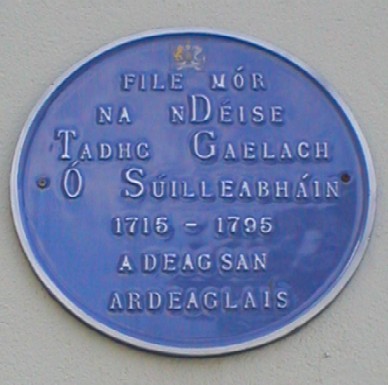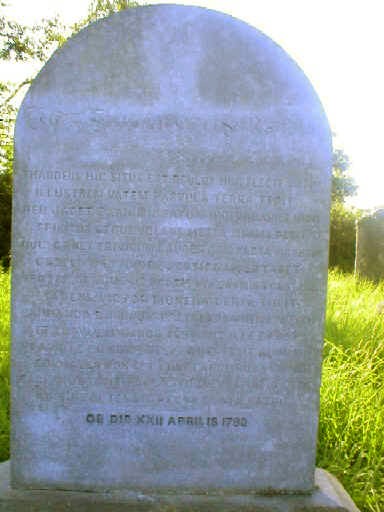| Tadhg Gaeleach
Ó'Súilleabháin (1715-95)
File mór na nDéise
|
 |
|
Rugadh é i Mintín Eoghain i gCondae Luimnigh sa bhliain 1715. Chaith sé cuid mhaith da shaol i gCondae Corcaighe go dtí 1767. Bhí sé 'na dhiaidh sin i nDún Garbhán agus is ansin a chum sé a chuid dánta diaga. Chaith sé tamall 'na dhiaidh sin i gCathair Phortláirge. D'éag sé sa bhliain 1795. Bhí a danta diaga ar eolas go foirleathan ar fuaid na Mumhan uile. Tadhg Gaelach O'Súilleabháin was born in Co. Limerick but he spent most of his life in County Waterford. He was well educated and fun loving but when he came to Waterford city he met up with Edmund Rice (at a music session in the Yellow House Inn on the Lacken Road). He was also friendly with two priests: An tAthair Piaras de Paor (Father Pierce Power) who was a Catholic Curate in Dungarvan and who composed the Pious Miscellany, printed in Clonmel in 1802 and an tAthair Maitios ÓMuiríosa P.P. (Fr. Matthew Morrissey). Under the influence of those three men he became very religious. In the nineteenth century his poems were often sung as hymns in Munster churches. For example, he wrote Duan Chroí Íosa, (Song of the Heart of Jesus}, which was used for years in the Sacred Heart Confraternity in Dungarvan. He died in 1795 in the doorway of the newly built Catholic Cathedral, where he was waiting to attend Mass and in 2001 a blue plaque to his memory was erected in the Cathedral grounds (see above). He was buried on April 22, 1795, in the ancient cemetery in Ballylaneen, about halfway between Kilmacthomas and Bunmahon. O'Súilleabháin's poems on religious topics reflect the gradual organisation of Roman Catholic piety as the end of the era of laws against Catholics was approaching. The music of the hymns is often haunting and very beautiful. Over his grave is a headstone with an inscription in Latin, composed by his fellow Irish poet, Donncha Rua Mac Conmara, (who is buried in Newtown, near Kilmacthomas) as follows.
|
| "Tadhg is put here. Cast your eyes here, traveller. The tiny earth touches the illustrious prophet. Oh! here lies the dead one. The spirit has vanquished irrevocable fate and flying seeks the highest stars. Who will sing the praises of the Irish, Who the deeds of men? With Gaelic Tadhg dead the Irish muses are silent. He has gone forward singing pious songs in learned numbers. Going on his way he has borne distinguished gifts. He has fashioned most famous songs for praising the Lord and sweet hymns will he fervently sing. Lament, oh people, your pupil has retired; Eochades is no longer; the country-side is silent. He sought peace with peace, therefore Isle lives on high. He goes to the happy kingdoms of the father above." |  |